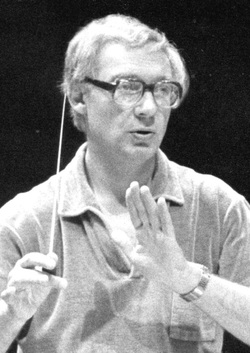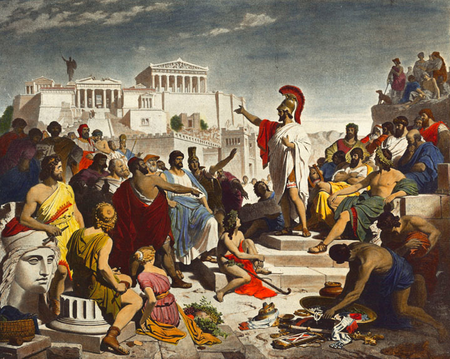In night’s dim shadows lying,
Our limbs fast lock’d in sleep,
to thee, with faithful sighing,
Our souls their vigil keep.
Desire of every nation,
Hear, Lord, our piteous cry;
Thou Word, the world’s salvation,
Uplift us where we lie.
Lord, be thine Advent hasten’d,
Lest sin thy people mar;
The gates which Adam fasten’d —
The gates of heav’n, unbar.
Son, to thine endless merit,
Redeemer, Saviour, Friend,
With Sire and Holy Spirit
Be praises without end. Amen.
Charles Coffin was born 4 October 1676 at Buzancy, Ardennes in the Duchy of Rheim and educated at College du Plessis. In 1701, he was appointed chief assistant to Charles Rollin, principal of the Collège de Beauvais. He succeeded Rollin as principal in 1712. That same year he was entrusted with the funeral oration for Louis, Duke of Burgundy, the father of Louis XV. In 1718. he became rector of the University of Paris, a post which he held until his death.
Hymns
Coffin published in 1727 some of his Latin poems, for which he was already noted, and in 1736 the bulk of his hymns appeared in the Paris Breviary of that year, an edition of which was published in 1838 at Oxford by John Henry Newman. 1736 also saw the publication of Coffin's Hymni Sacri Auctore Carolo Coffin, and in 1755 a complete edition of his Works was issued in 2 vols.
The Hymni Sacri included a poem adapted from the original chant, Jordanis oras prævia, which Rev. John Chandler later translated to the hymn On Jordan's Bank the Baptist's Cry set to the tune Winchester New for use at Matins during Advent. Chandler also translated Coffin's The Advent of Our King.
Among his other works is an ode in praise of the wines of Champagne. This work is a version of a similar poem in which Bénigne Grenan, professor at Harcourt College, praised the pre-eminence of Burgundy wine, and that one of Charles Coffin's Jansenist friends, Marc-Antoine Hersan, had had fun reciting one evening at a dinner.
Jansenism
While the papal bull Unigenitus condemned Jansenism, many in France interpreted it as an attack on the prerogatives of the French church. The University of Paris and the provincial Parlements were hotbeds of opposition. The University was known to harbor Jansenist sympathizers; the Parlement of Paris went so far as to threatened to confiscate the temporalities of the Archbishop. As rector of the University and clerk to the Parlement of Paris, even Coffin's hymns were viewed by some with suspicion.
Death
Coffin died of pneumonia in Paris 20 June 1749. Due to his persistence in appealing against the apostolic constitution Unigenitus, under instructions from the Archbishop, who wished to make an example, the parish rector of Saint-Étienne-du-Mont, refused to administer last rites to him, or give him a Christian burial Robert Darnton observed that, "To deny the final absolution of sins to Christians on their deathbed was, in the eyes of many, to send them straight to Purgatory, an unforgivable abuse of royal and ecclesiastical authority.” Four thousand Parisians joined the funeral procession. Because the crown had supported the suppression of the Jansenists, Danton notes that the religious rite took on political overtones. The Parlement of Paris subsequently issued an official and strong “remonstrance” to the king. Richard J. Janet sees the resulting popular demonstrations as contributing to the growing disenchantment with the monarchy that would later play into the coming Revolution.
Coffin left a legacy to the college of Beauvais, and founded awards at the University of Paris.

Taken from Wikipedia
George Guest was born in Bangor, Gwynedd. His father was an organist and Guest assisted him by acting as organ blower. He became a chorister at Bangor Cathedral and subsequently at Chester Cathedral, where he took organ lessons from the sub-organist, Dr. Roland Middleton. He passed the examinations for ARCO in 1940 and FRCO in 1942. By this time he had become the organist and choirmaster of Connah's Quay parish church, Flintshire.
Being proud of his Welsh roots, from the 1970s onwards, Guest took a personal interest in the Cambridge University Welsh Society (Cymdeithas Y Mabinogi), sponsoring many of its events and providing a welcome face for Welsh students away from home.
At the age of 18 he was called up for military service, and joined the Royal Air Force, being posted to India in 1945. On leaving the services in 1947 he took up the post of sub-organist at Chester Cathedral. The cathedral organist, Malcolm Boyle, encouraged him to apply for the organ scholarship at St John's College, Cambridge, for which he was successful.
At Cambridge he studied under Robin Orr, who had served as organist and choirmaster at St. John's College since 1938. In Guest's final year as Organ Scholar, Robin Orr announced that he intended to retire, and the College Council offered the post to Guest, who took over the position in 1951.
Within five years of Guest becoming organist and choirmaster, the whole future of the choir at St. John's College came into question, with the proposed closure of the day school which provided the choristers. Guest, with the support of his predecessor, persuaded the College to fund a Choir School.
Under George Guest's direction, the choir built up a formidable reputation, challenging the supremacy of the choir of King's College, Cambridge. Guest introduced a more "continental" tone into the choir, as George Malcolm was doing at Westminster Cathedral.
The choir began broadcasting on the BBC in the early 1950s and started making recordings in 1958. By the time of Guest's retirement in 1991, the choir had recorded sixty LPs or CDs under his direction.
For many years from 1972 the BBC broadcast Evensong from St. John's College on every Ash Wednesday, and the Advent Carol Service each year since 1981. During George Guest's tenure, the choir undertook many overseas tours.
In 1987 Guest was appointed Commander of the Order of the British Empire (CBE) in the Queen's Birthday Honours.
Herbert Howells and Michael Tippett are among the many composers who wrote liturgical settings for the St. John's College choir whilst George Guest was organist and choirmaster. They also include the French composer Jean Langlais, who wrote a setting of the psalm Beatus vir for the choir: a rare occurrence of a Continental composer writing for the English cathedral tradition.
Organ Scholars who studied under George Guest include:
Sir David Lumsden (Southwell Minster, New College, Oxford, Principal of the Royal Academy of Music, London)
Brian Runnett (organist, Norwich Cathedral)
Jonathan Bielby (organist, Wakefield Cathedral)
Jonathan Rennert (St Michael's, Cornhill)
David Hill (choral director) (sub-organist, Durham Cathedral; organist, Westminster Cathedral; organist, Winchester Cathedral; organist and choirmaster, St John's College, Cambridge; now Chief Conductor, BBC Singers)
Robert Huw Morgan (University Organist, Stanford Memorial Church)
Adrian Lucas (organist, Worcester Cathedral)
Andrew Lumsden (Southwark Cathedral, Westminster Abbey, Lichfield Cathedral, Winchester Cathedral)
Sir Stephen Cleobury (King's College, Cambridge)
John Scott (St Paul's Cathedral, London, and subsequently St Thomas Fifth Avenue, New York City)
Andrew Nethsingha (Truro Cathedral; Gloucester Cathedral; Organist and Director of Music, St John's College, Cambridge)
Preceded by
Robin Orr
Director of Music, St John's College, Cambridge
1951–1991 Succeeded by
Christopher Robinson
George Guest was a guest on Desert Island Discs in 1976 (http://www.bbc.co.uk/radio4/features/desert-island-discs/castaway/a5168c08#p009n0jz). He was a lifelong supporter of Chester City FC. The famous British baritone Simon Keenlyside was a chorister and subsequently a choral scholar in the choir of St John's College, Cambridge while George Guest was the choirmaster there. Actor Clive Mantle was another chorister at St. John's.
Taken from Wikipedia
George Guest on Desert Island Discs




